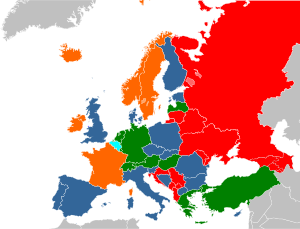


The legality of prostitution in Europe varies by country.
Some countries outlaw the act of engaging in sexual activity in exchange for money, while others allow prostitution itself, but not most forms of procuring (such as operating brothels, facilitating the prostitution of another, deriving financial gain from the prostitution of another, soliciting/loitering).
In 10 European countries (Belgium, Germany, Netherlands, Austria, Switzerland, Luxembourg, Greece, Hungary, Latvia, and Turkey), prostitution is legal and regulated.
Belgium became the first country in Europe to decriminalize sex work since 1 June 2022.[1]
The degree of enforcement of the anti-prostitution laws varies by country, by region, and by city. In many places, there is a big discrepancy between the laws which exist on the books and what happens in practice.
Depending on the country, various prostitution-related activities may be prohibited (where a specific law forbids such activity), decriminalized (where there is no specific law either forbidding or allowing and regulating the activity), or regulated (where a specific law explicitly allows and regulates the activity if certain conditions are met). Activities which are subject to the prostitution laws include: selling and buying sexual services, soliciting in public places, running brothels, deriving financial gain from the prostitution of another, offering premises to be used for prostitution etc. Often, the prostitution laws are not clear-cut, and are subject to interpretation, leading to many legal loopholes. While the policy regarding adult prostitution differs by country, child prostitution is illegal throughout Europe. Similarly, human trafficking, forced prostitution, and other abusive activities are also prohibited.
The legal and social treatment of prostitution differs widely by country. Very permissive prostitution policies exist in the Netherlands and Germany, and these countries are major destinations for international sex tourism. Amsterdam's prostitution windows are famous all over the world. In Sweden, Norway, Iceland, Northern Ireland, France and Ireland, it is illegal to pay for sex, but not to be a prostitute (the client commits a crime, but not the prostitute).[2] Other countries which have restrictive prostitution policies and officially affirm an anti-prostitution stance are Great Britain, Denmark and Finland. In countries such as Spain, Italy, and the Czech Republic, attitudes are more laissez-faire and tolerant, but prostitution is not officially recognized as a job, and not officially and legally regulated, and pimping is forbidden.
- ^ "LOI - WET". www.ejustice.just.fgov.be. Retrieved 25 June 2022.
- ^ "Nordic Model". Human Rights Lawyers. Retrieved 14 April 2018.